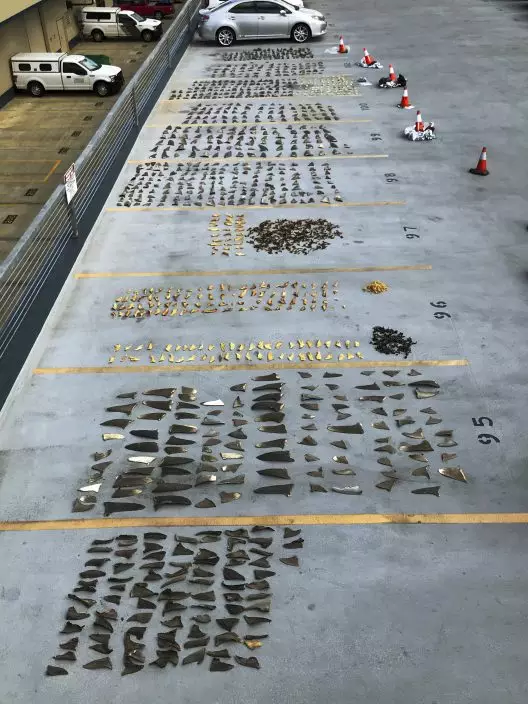U.S. prosecutors in Hawaii are accusing the owners and officers of a Japanese fishing boat of helping Indonesian fishermen smuggle nearly 1,000 shark fins, worth about $58,000 on the black market.
Boat owners Hamada Suisan Co. Ltd. and JF Zengyoren, or Japan Fisheries Cooperatives in English, are charged with aiding and abetting the smuggling. Ten fishermen have been charged with smuggling.
A Hamada representative in Japan said Friday that the Indonesian crew members had shark fins without the captain's knowledge.

This Nov. 28, 2018 photo provided by the United States Attorney's Office and introduced as evidence in court in Honolulu shows some of the hundreds of shark fins seized from a Japanese fishing boat. U.S. prosecutors in Hawaii accuse the owner and officers of the Japanese fishing boat of helping Indonesian fishermen smuggle nearly 1,000 shark fins. Hamada Suisan Co. Ltd., the Japanese business that owned the vessel, and JF Zengyoren, a Japanese fishing cooperative, were charged on Dec. 11, 2018, with aiding and abetting the trafficking and smuggling of shark fins. (U.S. Attorney's Office via AP)
JF Zengyoren declined to comment, saying it hadn't seen the complaint.
It's against U.S. law to remove the fins of sharks at sea. Prosecutors say the fishermen harvested fins from some sharks that were still alive and then discarded in the ocean.
Fins are a pricey delicacy often used in soups.
WASHINGTON (AP) — U.S. intelligence officials have determined that Russian President Vladimir Putin likely didn’t order the death of imprisoned opposition leader Alexei Navalny in February, according to an official familiar with the determination.
While U.S. officials believe Putin was ultimately responsible for the death of Navalny, who endured brutal conditions during his confinement, the intelligence community has found “no smoking gun” that Putin was aware of the timing of Navalny's death — which came soon before the Russian president's reelection — or directly ordered it, according to the official.
The official spoke on the condition of anonymity to discuss the sensitive matter.
Soon after Navalny’s death, U.S. President Joe Biden said Putin was ultimately responsible but did not accuse the Russian president of directly ordering it.
At the time, Biden said the U.S. did not know exactly what had happened to Navalny but that “there is no doubt” that his death “was the consequence of something that Putin and his thugs did.”
Navalny, 47, Russia’s best-known opposition politician and Putin’s most persistent foe, died Feb. 16 in a remote penal colony above the Arctic Circle while serving a 19-year sentence on extremism charges that he rejected as politically motivated.
He had been behind bars since January 2021 after returning to Russia from Germany, where he had been recovering from nerve-agent poisoning that he blamed on the Kremlin.
Russian officials have said only that Navalny died of natural causes and have vehemently denied involvement both in the poisoning and in his death.
In March, a month after Navalny’s death, Putin won a landslide reelection for a fifth term, an outcome that was never in doubt.
The Wall Street Journal first reported about the U.S. intelligence determination.

FILE - Russian opposition politician Alexei Navalny gestures while speaking during his interview to the Associated Press in Moscow, Russia on Dec. 18, 2017. U.S. intelligence officials have determined that Russian President Vladimir Putin likely didn't order the death of Navalny, the imprisoned opposition leader, in February of 2024. An official says the U.S. intelligence community has found "no smoking gun" that Putin was aware of the timing of Navalny's death or directly ordered it. (AP Photo/Alexander Zemlianichenko, File)











